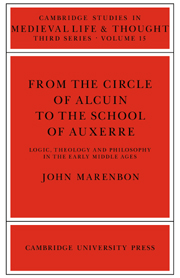 From the Circle of Alcuin to the School of Auxerre
From the Circle of Alcuin to the School of Auxerre Published online by Cambridge University Press: 24 October 2009
No early medieval treatment of the Categories and the problems connected with them is as wide-ranging or as original as that which John Scottus provided in his masterpiece, the Periphyseon. No other treatment had so much influence on the scholars of the late ninth and tenth centuries who tackled these problems. A study of the doctrine of the Categories as it appears in the Periphyseon will therefore provide a centrepiece to my whole survey. First, however, I will look at a piece of material which perhaps gives some clues to the direct antecedents to John's theory of Universals.
The only record which survives of a controversy on the World Soul between Ratramnus of Corbie and an unnamed monk of Saint-Germer de Fly is Ratramnus's Liber de anima ad Odonem Bellovacensem. This book, written in the early 860s, is a reply to the answer which the monk of Saint-Germer had written to Ratramnus's original objections to his ideas. However, the monk of Saint-Germer professed to be expounding, not his own views, but those of his master, a certain Macarius, who, despite several attempts, cannot convincingly be identified with any figure from other sources. This chronology would suggest that Macarius began to expound his views to his pupils some time in the 850s, if not before. Moreover, Macarius is described as ‘Scottus’, an Irishman, and this makes some connection, or common background, with John Scottus particularly probable, since the links between the various Irishmen on the Continent were strong.
To save this book to your Kindle, first ensure [email protected] is added to your Approved Personal Document E-mail List under your Personal Document Settings on the Manage Your Content and Devices page of your Amazon account. Then enter the ‘name’ part of your Kindle email address below. Find out more about saving to your Kindle.
Note you can select to save to either the @free.kindle.com or @kindle.com variations. ‘@free.kindle.com’ emails are free but can only be saved to your device when it is connected to wi-fi. ‘@kindle.com’ emails can be delivered even when you are not connected to wi-fi, but note that service fees apply.
Find out more about the Kindle Personal Document Service.
To save content items to your account, please confirm that you agree to abide by our usage policies. If this is the first time you use this feature, you will be asked to authorise Cambridge Core to connect with your account. Find out more about saving content to Dropbox.
To save content items to your account, please confirm that you agree to abide by our usage policies. If this is the first time you use this feature, you will be asked to authorise Cambridge Core to connect with your account. Find out more about saving content to Google Drive.